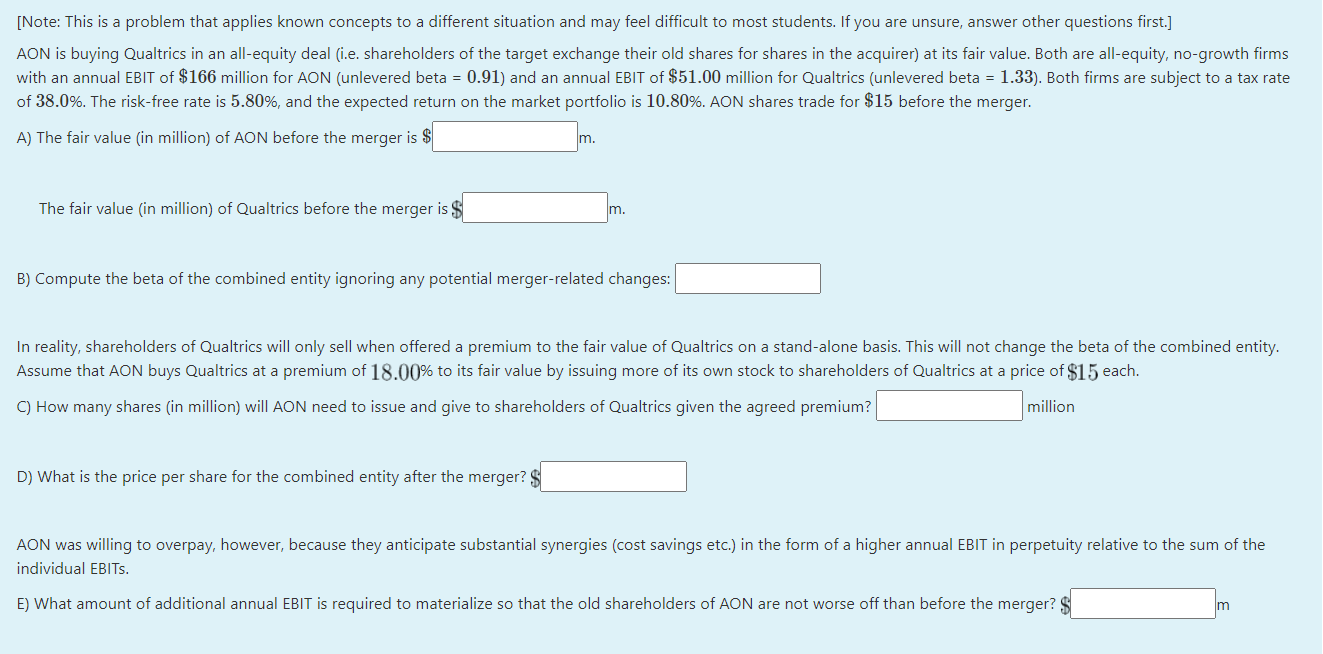
[Note: This is a problem that applies known concepts to a different situation and may feel difficult to most students. If you are unsure, answer other questions first.] AON is buying Qualtrics in an all-equity deal (i.e. shareholders of the target exchange their old shares for shares in the acquirer) at its fair value. Both are all-equity, no-growth firms with an annual EBIT of $166 million for AON (unlevered beta = 0.91) and an annual EBIT of $51.00 million for Qualtrics (unlevered beta = 1.33). Both firms are subject to a tax rate of 38.0%. The risk-free rate is 5.80%, and the expected return on the market portfolio is 10.80%. AON shares trade for $15 before the merger. A) The fair value in million) of AON before the merger is $ The fair value (in million) of Qualtrics before the merger is $ m. B) Compute the beta of the combined entity ignoring any potential merger-related changes: In reality, shareholders of Qualtrics will only sell when offered a premium to the fair value of Qualtrics on a stand-alone basis. This will not change the beta of the combined entity. Assume that AON buys Qualtrics at a premium of 18.00% to its fair value by issuing more of its own stock to shareholders of Qualtrics at a price of $15 each. C) How many shares (in million) will AON need to issue and give to shareholders of Qualtrics given the agreed premium? million D) What is the price per share for the combined entity after the merger? $ AON was willing to overpay, however, because they anticipate substantial synergies (cost savings etc.) in the form of a higher annual EBIT in perpetuity relative to the sum of the individual EBITS. E) What amount of additional annual EBIT is required to materialize so that the old shareholders of AON are not worse off than before the merger? $ m [Note: This is a problem that applies known concepts to a different situation and may feel difficult to most students. If you are unsure, answer other questions first.] AON is buying Qualtrics in an all-equity deal (i.e. shareholders of the target exchange their old shares for shares in the acquirer) at its fair value. Both are all-equity, no-growth firms with an annual EBIT of $166 million for AON (unlevered beta = 0.91) and an annual EBIT of $51.00 million for Qualtrics (unlevered beta = 1.33). Both firms are subject to a tax rate of 38.0%. The risk-free rate is 5.80%, and the expected return on the market portfolio is 10.80%. AON shares trade for $15 before the merger. A) The fair value in million) of AON before the merger is $ The fair value (in million) of Qualtrics before the merger is $ m. B) Compute the beta of the combined entity ignoring any potential merger-related changes: In reality, shareholders of Qualtrics will only sell when offered a premium to the fair value of Qualtrics on a stand-alone basis. This will not change the beta of the combined entity. Assume that AON buys Qualtrics at a premium of 18.00% to its fair value by issuing more of its own stock to shareholders of Qualtrics at a price of $15 each. C) How many shares (in million) will AON need to issue and give to shareholders of Qualtrics given the agreed premium? million D) What is the price per share for the combined entity after the merger? $ AON was willing to overpay, however, because they anticipate substantial synergies (cost savings etc.) in the form of a higher annual EBIT in perpetuity relative to the sum of the individual EBITS. E) What amount of additional annual EBIT is required to materialize so that the old shareholders of AON are not worse off than before the merger? $ m







